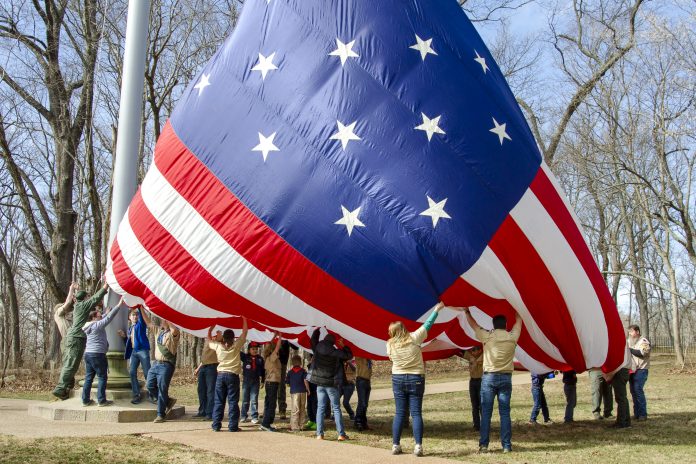By Don Steen ~ Staff Writer • reporter@psci.net
The 100th annual Lincoln Day Ceremony was met with clear skies and comfortable weather Sunday afternoon. It was a day fit for song, and there was plenty of that to go around as the celebration commenced. Indeed, the music of Lincoln’s life was the subject of this year’s history presentation.
Ceremonies to honor Abraham Lincoln and his mother, Nancy Hanks Lincoln, are a longstanding tradition at the old pioneer cemetery. These were initially carried out by veterans of the Grand Army of the Republic, but in 1924 the Boonville Press Club began formally sponsoring the annual programs that continue to this day.
The first Lincoln Day events were carried out at a pavilion built near the graveside of Nancy Hanks. Beginning in 1944, the bulk of the ceremony was moved to the new memorial building, followed by a pilgrimage to the grave site.
Boy Scouts from St. Meinrad and Chrisney began the day by hoisting a 20×32-foot garrison flag (the size of a two-car garage) 120 feet into the air. The 15 stars and 15 stripes fluttered mightily in the crisp wind from atop the flagpole soaring above the little pioneer cemetery.
LBNM Superintendent Rhonda Schier opened the ceremony by thanking the scouts for their assistance hoisting the flag. Keeping every inch of it off the ground proved a challenge, but the youngest of the scouts were quick on their feet, running under the giant star-spangled tent to keep every fold out of the mud.
“This is a really big flag,” was a common refrain.
The ceremony then yielded the floor to the Celebration Singers, who filled the front rows of the memorial chapel with a selection of songs relevant to the proceedings. In addition to the Battle Hymn of the Republic, the regional singers performed two historically significant songs that symbolize the life and legacy of Abe Lincoln.
Dixie, written and popularized just before the Civil War, is often remembered as the de facto anthem of the Confederate States. “Lift Every Voice and Sing”, in contrast, was first recited in 1900 and invokes the struggles of freed slaves and their descendants following the collapse of Reconstruction. “Lift Every Voice and Sing” has become an unofficial anthem for the Civil Rights Movement and is commonly sung at demonstrations to this day.
Schier expressed gratitude for so many volunteers from Celebration Singers joining the proceedings that day.
“It’s been a long time since this hall has seen the likes of that performance,” she said.
The songs also served as a suitable introduction for featured speaker Dr. Christian McWhirter, Lincoln Historian of the Abraham Lincoln Presidential Library and author of Battle Hymns: The Power and Popularity of Music in the Civil War. McWhirter joked that he seldom had the opportunity to visit places such as the Lincoln Boyhood National Memorial growing up as an unlikely Civil War buff in Ontario.
McWhirter’s focus of study is on the music of Lincoln’s time, and how it impacted the Great Emancipator throughout his life. Indeed, he pointed out that Lincoln came of age at much the same time as the what we now refer to as the “music industry”.
Lincoln’s first exposure to music would have been the folk traditions of the frontier, homegrown songs accompanied by handcrafted instruments and hymns carried down through the generations. As he grew more mature, however, so too did American music.
McWhirter noted that standard musical instruments became much more accessible in the years leading up the Civil War. Coupled with widely distributed sheet music, new songs could quickly spread across the continent, even to the simple pioneer community that Lincoln called home.
That does not necessarily mean that Lincoln made a name for himself as a singer in his own right. In fact, with very few exceptions, contemporary critics struggled to be polite regarding his ability.
Henry Clay Whitney, an attorney and friend of Lincoln, did note that Lincoln appreciated music in his own way, however. According to Whitney, “he fancied that the creator… made music as a simple, unalloyed pleasure.”
McWhirter noted that Lincoln’s musical tastes are heavily influenced by his upbringing in frontier Indiana.
“Lincoln has no sense of high culture and low culture,” he said. “Lincoln likes what he likes and he doesn’t care if it’s considered highfalutin by some folks and he doesn’t care if it’s considered crude by other folks. This sticks with him throughout his life. When he’s in the presidential years he’s going to operas, he’s going to professional concerts by the Marine band, but he’s also singing goofy songs and making speeches about ‘Dixie’”.
Lincoln’s favorite song, at least according to the majority of sources, was likely “Twenty Years Ago” by William Willing, a sentimental ballad about a man returning to his hometown and being overcome with memories of an irretrievable past.
Read the rest of this story in this week’s issue of the Spencer County Leader!
Featured Image: Boy Scout Troop members take part in raising the Garrison Flag at the 100th Annual Lincoln Day ceremony

Flying High: The Garrison Flag flew high and proud at the 100th annual Lincoln Day ceremony

Hitting the right notes: Celebration singers sang a lineup of different songs at the ceremony


Dr. Christian McWhirter, Lincoln Historian of the Abraham Lincoln Presidential Library and author of Battle Hymns: The Power and Popularity of Music in the Civil War spoke to attendees of the 100th Annual Lincoln Day ceremony


Attendees of the event participated in a pilgrimage procession led by the Sons of Union Veterans

Daryl Lovell gave this year’s eulogy at the gravesite of Nancy Hanks Lincoln






